Barbecue on the Mexican War Streets: Dinner with Khet Mar and Family
by Elizabeth Hoover / August 16, 2010 / 1 Comment
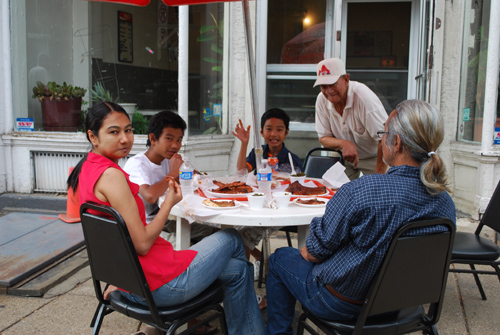
From left to right: Khet Mar, Whan Than, Linn Thit Nway Oo, George Wilson, Than Htay
The Mexican War streets have a particular smell: a faint odor of burning wood, pepper, and spices. This smell so permeated my childhood, I didn’t notice it until I moved away for college. Coming back home, I would drink in the smoky aroma that settles on the neighborhood in the late mornings and lingers on into the evenings.
It’s the smell of Wilson’s Barbecue on the corner of Buena Vista and North Taylor. Owner George Wilson has been a fixture in the neighborhood for fifty years and his slabs of ribs and charred chicken have marked countless graduations, confirmations, family reunions or just those summer days when it’s too hot too cook.
Naturally, when I thought how I could welcome Burmese writer Khet Mar and her family to the neighborhood of my youth, I thought of Wilson’s.
Khet Mar left Burma in 2009 after her relief work for the victims of Cyclone Nargis attracted the attention of the authorities, whose official line was that relief work wasn’t needed. Fearing arrest, she traveled to Pittsburgh to become City of Asylum’s writer-in-residence there. She came with her husband, the artist Than Htay Maung, and her two sons, Linn Thit Nway Oo, 9, and Wan Than, 13.
Visiting Khet Mar, I am often greeted by the smells of sour soup or stewing fish. While working on my article on the Burmese refugee community in Pittsburgh, she accompanied me to a monastery where we were served spicy curry, dried fish in oil, and mounds of rice. It was my first introduction to Burmese food and I was eager to return the favor.
On the walk over to Wilson’s I asked Wan Than what his favorite food is. He said rice, ubiquitous in Burmese meals.
“How do you like American food?” I asked
He wrinkled his nose and said he didn’t like it. Linn Thit Nway Oo added that he wasn’t hungry. My heart sank but I stubbornly refused to believe they wouldn’t fall in love with Wilson’s.
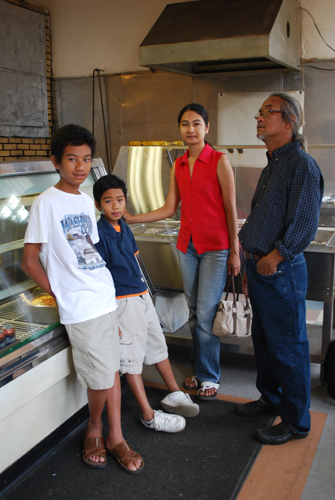
Waiting for our order inside Wilson’s
Once there, I ordered us two slabs of ribs and sides of peppered collards. Wilson’s is a no-nonsense kind of place with its huge ovens set into unadorned walls. Since it mostly does take out, it only has one table, which is set out on the sidewalk during the summer months. The five of us circled up out there.
We dug in. The ribs were just like I remembered them, tender pork falling off the bone, the meat soaked in a smoky sauce with just the right amount of kick. While we were eating, I asked the boys about their experiences in America. Wan Than earliest memory of Pittsburgh was that it was dark and cold because they arrived early in the morning. The boys were mesmerized by the snow.
“We don’t have snow in Burma,” he said. When Linn Thit Nway Oo first saw snow, he made a snowball and tried to keep it in the freezer. He quickly learned that there would be plenty more where that came from and he didn’t need to save handfuls. They both said they really like their school, but that it is different from schools in Burma.
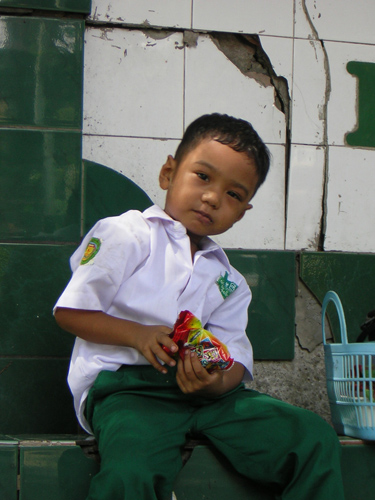
Linn Thit Nway Oo in his school uniform in Burma
“What makes it different?” I asked.
“Here they give you lunch and breakfast!” Linn Thit Nway Oo said. Wan Than added that they studied English in Burma, but struggled when they first arrived because everyone spoke so fast. Now the boys seem to be ably navigating the packed schedule of American students with sports, camps, and activities.
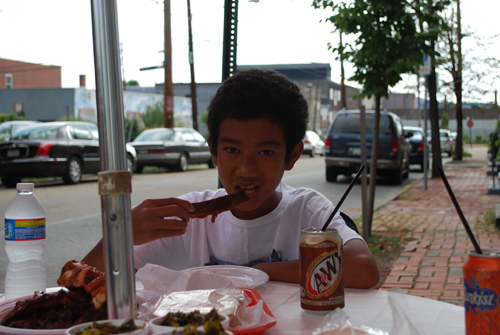
Wan Than enjoying ribs at Wilson’s
Wan Than is a little more reserved that his younger brother, who, like any 8-year-old, can barely sit still. This summer, they had their first experience with sleep-away camp, and Linn Thit Nway Oo busied himself by listing all their activities. “Shoot guns, shoot bb guns, shoot arrows, go fishing, go swimming.”
“Is camp your favorite thing about America?” I asked
“No! The internet,” Linn This Nway Oo said. Wan Than explained that they didn’t have Internet in Burma and were excited to play computer games when they got here. They also spend a lot of time learning about American music on YouTube. Linn Thit Nway Oo has an encyclopedic knowledge of contemporary American hip-hop and named a dozen or so of his favorite acts including Usher, Nick Minaj, and 50 Cent.
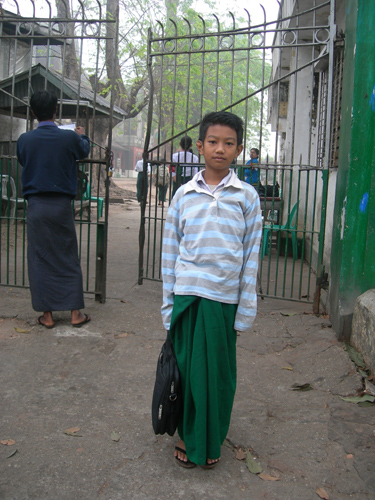
Wan Than in his school uniform in Burma
“We can’t listen to their music because we don’t understand it!” Khet Mar rolled her eyes. “They say our music sounds like people wailing.”
Than Htay Maung added they prefer the Beatles and Cliff Richards.
A potential family feud about music was cut short by George Wilson, who came out to greet his customers. Now in his eighties, he usually just mans the pits in the early afternoon. Since he lives above the restaurant, it’s easy for him to pop on by and visit his customers and neighbors.
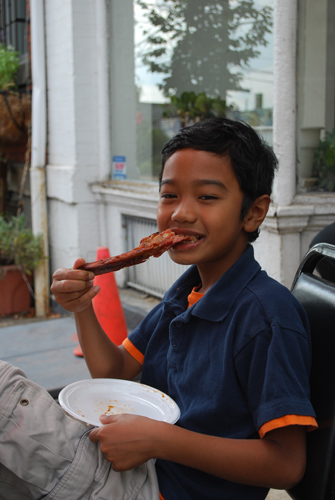
Linn Thit Nway Oo enjoys a rib
“I love to see people eat!” He said. “It just seems so healthy to watch people enjoying their food.” He instructed the boys to take slices of white bread and soak up the sauce that he is famous for. Wilson learned to make it from his great grandfather in his native Louisiana.
“That sauce was made by slaves,” he said. “They wouldn’t talk about it though. If you asked them about slavery they’d run you out of the house.”
His great-grandfather and grandfather barbecued in an old tub with chicken wire stretched over it—a set-up they could moved from place to place. Wilson trained as a butcher in Little Rock and came north as a teenager when his father got a job in Pittsburgh. After a stint in the army, Wilson returned to Pittsburgh and started barbecuing in his backyard in Manchester. Ten years later he moved to North Taylor.
He said his building used to be a furniture store. “The owner named his price,” he added. “It was about as much money as I had in my pocket. Worth a lot more now.”
Wilson regaled us with tales of what the neighborhood was like fifty years ago. He told us that he and his friends used patrol the neighborhood back in its crime-ridden days. “Neighborhood has changed a lot,” he said. The conversation was getting a bit too serious for Linn Thit Nway Oo, who turned our attention to a more important topic: how he wants a puppy.
“Um, no,” Khet Mar declared.
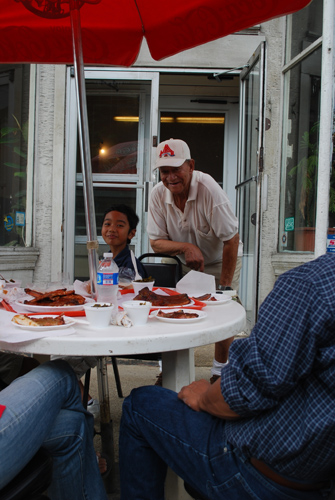
George Wilson with Linn Thit Nway Oo
Luckily an 8-year-old’s attention span isn’t very long and he soon became involved with trying to climb a nearby street sign. While Wilson told me about his time in the Army, a neighbor came over and started chatting with Than Htay Maung, Khet Mar, and, Wan Than. When the neighbor found out that Than Htay Maung is an artist, he went back into his house to bring out a wire sculpture that he made. It was a housefly, complete with flapping wings.
We all crowded around the ingenious sculpture and Wilson made his way back inside.
“I’m going to let y’all enjoy your dinner,” he said.
Wan Than seems to take after his father, who is an installation artist and recently completed a giant mural on the side of their house. Wan Than has been drawing since he was small and Khet Mar used his work to illustrate a book of her essays published in Burma. He still paints and draws and says he “maybe” wants to be an artist. He likes to go to the library and look at books about art, but hates going to the museum because his dad “takes too long to look at things.”
I asked him if he missed Burma and he said he didn’t, except his misses his Grandmother. He also has a hard time keeping in touch with his friends because they don’t have Internet.

Linn Thit Nway Oo and Wan Than at their school in Burma
“If you could get in touch with them, what would you say?” I asked.
“I’d say I’m happy here,” he replied.
“In America the houses have air conditioners, freezers, and dishwashers,” Linn Thit Nway Oo interjected.
Wan Than has a more serious take. “Here you have more freedoms,” he said. “In Burma you can’t go to camp, or go swimming. There’s no Internet. No libraries.”

Khet Mar and Linn Thit Nway Oo after our meal
It had been a hot day, but now the sky was clouding over and the wind was picking up. We decided to pack up our leftovers and head back before the rain. We pushed back their seats and rubbed our full bellies. Linn Thit Nway Oo, who wasn’t hungry when we left the house, had a half dozen bones on his plate and so did his brother. Maybe Wan Than has changed his mind about American food.
Read Elizabeth’s bio.
Photos of at Wilson’s by Elizabeth Hoover
Photos from Burma courtesy of Khet Mar

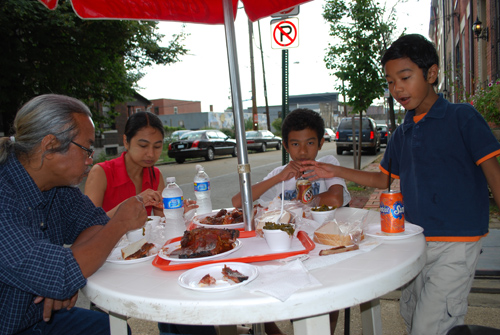




One Comment on "Barbecue on the Mexican War Streets: Dinner with Khet Mar and Family"
This was a wonderful interview, because it gave such a great perspective of all members of this beautiful family. Thank you. Rita Nieman